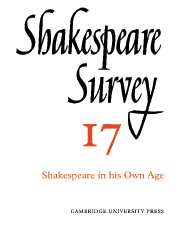Book contents
- Frontmatter
- THE DAILY LIFE
- 1 London and the Court
- 2 Provincial Life
- 3 Sailors and the Sea
- 4 Elizabethans and Foreigners
- 5 Education and Apprenticeship
- 6 The Law and the Lawyers
- 7 London’s Prisons
- PHILOSOPHY AND FANCY
- 8 The Commonwealth
- 9 Dissent and Satire
- 10 Scientific Thought
- 11 Medicine and Public Health
- 12 The Folds of Folklore
- 13 Symbols and Significances
- ART AND ENTERTAINMENT
- 14 Actors and Theatres
- 15 The Printing of Books
- 16 Music and Ballads
- 17 The Foundations of Elizabethan Language
- Notes
- Index
- Plate section
4 - Elizabethans and Foreigners
Published online by Cambridge University Press: 28 March 2007
- Frontmatter
- THE DAILY LIFE
- 1 London and the Court
- 2 Provincial Life
- 3 Sailors and the Sea
- 4 Elizabethans and Foreigners
- 5 Education and Apprenticeship
- 6 The Law and the Lawyers
- 7 London’s Prisons
- PHILOSOPHY AND FANCY
- 8 The Commonwealth
- 9 Dissent and Satire
- 10 Scientific Thought
- 11 Medicine and Public Health
- 12 The Folds of Folklore
- 13 Symbols and Significances
- ART AND ENTERTAINMENT
- 14 Actors and Theatres
- 15 The Printing of Books
- 16 Music and Ballads
- 17 The Foundations of Elizabethan Language
- Notes
- Index
- Plate section
Summary
'The three corners of the world'
The impact of foreigners on a community or a culture is affected, obviously enough, both by the opportunities for contact and knowledge that exist, and by the framework of assumptions within which information about foreign lands and customs is presented and received. The period with which we are concerned here - let us say the sixteenth and early seventeenth centuries - is well known as one in which the amount of scientific information about the world increased dramatically. In the Renaissance period England, like the rest of Europe, acquired modern-style maps; trade-contacts with Turkey and Russia became a commonplace feature of economic life; visitations of Red Indians, Eskimos, and Negroes, an influx of refugees from Europe, plantations in the New World, and knowledge of other European ventures of a similar kind - all this might seem to give the average Englishman of the early seventeenth century almost as much expertise in physical geography as is possessed by his modern counterpart. But this is to reckon without the 'framework of assumptions'. It is probably true to say that by the early decades of the seventeenth century more scientific information was available than could be digested within the terms in which the world was traditionally conceived; and it is certainly true that the facts of physical geography which were accepted by sailors as useful in practice were very difficult to accommodate within the sophisticated and complex traditions that form the natural background to literature.
What was the framework of assumptions concerning foreigners? When we look at medieval writings seeking for information that bears on the question, 'what attitudes to foreigners were traditional in English literature?' we find little evidence; and this very absence must be our starting-point. Most medieval literature is located in a dimension that cares little for the compass.
- Type
- Chapter
- Information
- Shakespeare Survey , pp. 37 - 52Publisher: Cambridge University PressPrint publication year: 1964
- 5
- Cited by

